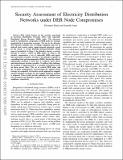Security Assessment of Electricity Distribution Networks Under DER Node Compromises
Author(s)
Shelar, Devendra Anil; Amin, Saurabh
DownloadAmin_Security assessment.pdf (2.897Mb)
OPEN_ACCESS_POLICY
Open Access Policy
Creative Commons Attribution-Noncommercial-Share Alike
Terms of use
Metadata
Show full item recordAbstract
This paper focuses on the security assessment of electricity distribution networks (DNs) with vulnerable distributed energy resource (DER) nodes. The adversary model is a simultaneous compromise of DER nodes by strategic manipulation of generation setpoints. The loss to the defender (DN operator) includes loss of voltage regulation and cost of induced load control under supply-demand mismatch caused by the attack. A three-stage defender-attacker-defender (DAD) game is formulated: in Stage 1, the defender chooses a security strategy to secure a subset of DER nodes; in Stage 2, the attacker compromises a set of vulnerable DERs and injects false generation setpoints; in Stage 3, the defender responds by controlling loads and non-compromised DERs. Solving this trilevel optimization problem is hard due to nonlinear power flows and mixed-integer decision variables. To address this challenge, the problem is approximated by a tractable formulation based on an ε-linear power-flow model. The set of critical DER nodes and the setpoint manipulations characterizing the optimal attack strategy are computed. An iterative greedy approach to computing attacker-defender strategies for the original nonlinear problem is proposed. These results provide guidelines for optimal security investment and defender response in preattack and postattack conditions, respectively.
Date issued
2016-08Department
Massachusetts Institute of Technology. Department of Civil and Environmental EngineeringJournal
IEEE Transactions on Control of Network Systems
Publisher
Institute of Electrical and Electronics Engineers (IEEE)
Citation
Shelar, Devendra, and Saurabh Amin. “Security Assessment of Electricity Distribution Networks Under DER Node Compromises.” IEEE Transactions on Control of Network Systems 4.1 (2017): 23–36.
Version: Author's final manuscript
ISSN
2325-5870